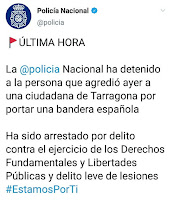Joanna Cherry is a Scottish lawyer. She is a member of
the élite of her profession that are known as Queen’s Counsel. As such she is allowed
to put the letters QC after her name, charge higher fees, and wear a silk gown
in court.
Joanna Cherry QC is a member of the British Parliament,
the member for Edinburgh South West. As such she puts the letters MP after her name.
She sits for the Scottish National Party and is its parliamentary spokesperson
on Justice and Home Affairs. She is positioning herself as a potential future
leader of the party.
Joanna Cherry QC MP is an important person who holds
two public posts of great responsibility.
Joanna Cherry QC MP supports sedition in Spain and
makes no secret of the fact.
We have met Joanna Cherry QC MP before; she had a
walk-on part in
this post as one of the people who accepted a freebie from the Catalan government
to act as “observers” at the referendum on 1 October 2017. Why a British
lawyer, especially one who is allowed to wear a silk gown, chose to lend her prestige
to an act that was illegal at the time and has since been judged seditious is a
matter on which some may wish to speculate.
On 13 December 2018 Joanna Cherry QC MP issued this
tweet.
Carme Forcadell was once a rabble-rousing populist.
 |
| Catalonia – Europe’s next state |
However, in the autumn of 2017 she was the speaker of
the Catalan parliament when, in the words of the Economist:
…
the separatists used their narrow majority in the Catalan parliament to ram
through laws tearing up the constitution and the region’s statute of home rule.
They deployed the resources of the Generalitat [Catalan government] to organise
their “binding referendum” on independence, which they then used to declare an
independent republic. They did all this despite repeated warnings of the
illegality of their actions.
This is the extremely serious criminal action for which
Forcadell was charged and held on remand, and for which she has now been given 11½
years for sedition, as have her fellow prisoners. One might suppose that Joanna Cherry QC MP, lawyer and
parliamentarian, would stand on the side of the rule of law and constitutional
government. But she doesn’t.
Instead, Joanna Cherry QC MP chooses to propagate the
lie that Spain has political prisoners. Personal opinions may differ, but a
British lawyer and parliamentarian should be guided initially by the good
reputation enjoyed by Spain a member of the EU, NATO and the Council of Europe,
and by the fact that neither Amnesty International nor Human Rights Watch
mentions political prisoners in the country (“prisoners of conscience” in
Amnesty’s usual terminology). She knows this of course. Lawyers, especially the
posh ones who wear silk gowns, and MPs, especially those who join specialist
All Party Parliamentary groups, do their homework before they make public statements.
Nevertheless, she chooses to pose with this lying placard.

It goes without saying that Joanna Cherry QC MP, silk-gowned
lawyer and SNP parliamentary spokesperson for Justice, knows perfectly well what
she is doing. She has Spanish and Catalan at a good level and follows the local
traditional and social media easily. This must, at least be a very reasonable
assumption. She is, after all, a member of the UK All-Party Parliamentary Group
on Catalonia and was an observer at the illegal referendum. How could she
possibly perform these duties conscientiously without having first-hand knowledge
of all the local circumstances?

The British House of Commons met on Saturday 19 October
2019 to debate Brexit. Joanna Cherry QC MP was there, wearing the Yellow Ribbon
of Sedition as her
Westminster Leader Ian Blackford had done a few days earlier. The SNP has
so far run its campaign for Scottish separation legally. One must wonder, however,
what will happen if it runs into serious difficulty. Might the party’s taste
for sedition abroad spread nearer to home? At present they seem content with the traditional
British policy of legality at home and mayhem abroad. But who can tell?
Joanna Cherry QC MP, silk-gowned lawyer and parliamentary
spokesperson on Justice, aspires to lead her party and perhaps even to be the
Scottish First Minister who negotiates the entry of an independent Scotland
into the EU. In doing so, she will meet David Sassoli, the President of the European
Parliament. He has expressed his unambiguous respect for the rule of law in
Spain and for this judgment in particular. His immediate predecessor Antonio Tajani
is also clear: “Under Italian law the independence leaders would be in prison
for the rest of their lives.” Commission President Jean-Claude Juncker has said
“Nationalisms are a poison that prevent Europe from working together.”
The simple truth is that the EU leaders prize the rule
of law and European unity highly, and hate nationalism and separatism wholeheartedly.
How will Joanna Cherry QC MP and seditionist react when confronted with real European
democratic politics in a real, democratic political institution, one that is a world
away from the posturing, dilettante play-acting of the Scottish National Party?
Sources
(English)
The
Scotsman
YouTube
The
Economist
Human
Rights Watch
Amnesty
International
euobserver
(Spanish)
Europapress
(The President of the European Parliament
respects the ruling of the Spanish Supreme Court and calls for a reduction of
tension in Catalonia)
El
Español
Antonio Tajani: “Under Italian law the
independence leaders would be in prison for the rest of their lives.”





























